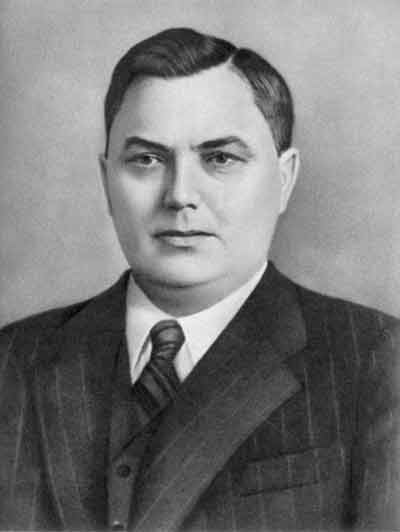More languages
More actions
(Added image) Tag: Visual edit |
(19th congress) Tag: Visual edit |
||
| Line 4: | Line 4: | ||
== Political career == | == Political career == | ||
During the [[Second World War|Great Patriotic War]], Malenkov was a member of the State Defense Committee. After the war, he advocated for increasing basic industry and military strength, while [[Andrei Zhdanov]] prioritized ideology and living standards. After [[Joseph Stalin|Stalin]] died in 1953, Malenkov became Premier of the Soviet Union and Khrushchev became General Secretary of the [[Communist Party of the Soviet Union|CPSU]]. In 1957, Khrushchev expelled Malenkov, [[Vyacheslav Molotov|Molotov]], and [[Lazar Kaganovich|Kaganovich]] from the Central Committee.<ref name=":0">{{Citation|author=Roger Keeran, Thomas Kenny|year=2010|title=Socialism Betrayed: Behind the Collapse of the Soviet Union|chapter=Two Trends in Soviet Politics|page=25–32|pdf=https://ipfs.io/ipfs/bafykbzaceaj5ucph44bjwyhlhsbycckr3ts76zbucn2hbrea32tltcd4s5ekg?filename=Roger%20Keeran_%20Thomas%20Kenny%20-%20Socialism%20Betrayed_%20Behind%20the%20Collapse%20of%20the%20Soviet%20Union-iUniverse.com%20%282010%29.pdf|publisher=iUniverse.com|isbn=9781450241717}}</ref> | During the [[Second World War|Great Patriotic War]], Malenkov was a member of the State Defense Committee. After the war, he advocated for increasing basic industry and military strength, while [[Andrei Zhdanov]] prioritized ideology and living standards.<ref name=":0" /> At the 19th Party Congress in 1952, Malenkov defended the [[Moscow trials|purge]] of [[Trotskyism|Trotskyists]] and [[Nikolai Bukharin|Bukharinists]]. He also promoted [[self-criticism]] and party discipline and restated the importance of ideological work.<ref name=":02233232">{{Citation|author=Ludo Martens|year=1996|title=Another View of Stalin|chapter=From Stalin to Khrushchev|isbn=9782872620814|publisher=Editions EPO|pdf=https://gateway.ipfs.io/ipfs/bafykbzaceab64vxtxpqt2cdl4zsrsftmedqidn4foq74gr25qkd35z5nwogdi?filename=Ludo%20Martens%20-%20Another%20View%20of%20Stalin-Editions%20EPO%20%281996%29.pdf|page=256–}}</ref> | ||
After [[Joseph Stalin|Stalin]] died in 1953, Malenkov became Premier of the Soviet Union and Khrushchev became General Secretary of the [[Communist Party of the Soviet Union|CPSU]]. In 1957, Khrushchev expelled Malenkov, [[Vyacheslav Molotov|Molotov]], and [[Lazar Kaganovich|Kaganovich]] from the Central Committee.<ref name=":0">{{Citation|author=Roger Keeran, Thomas Kenny|year=2010|title=Socialism Betrayed: Behind the Collapse of the Soviet Union|chapter=Two Trends in Soviet Politics|page=25–32|pdf=https://ipfs.io/ipfs/bafykbzaceaj5ucph44bjwyhlhsbycckr3ts76zbucn2hbrea32tltcd4s5ekg?filename=Roger%20Keeran_%20Thomas%20Kenny%20-%20Socialism%20Betrayed_%20Behind%20the%20Collapse%20of%20the%20Soviet%20Union-iUniverse.com%20%282010%29.pdf|publisher=iUniverse.com|isbn=9781450241717}}</ref> | |||
== References == | == References == | ||
[[Category:Communists]] | [[Category:Communists]] | ||
Latest revision as of 20:24, 30 March 2023
Georgy Malenkov Георгий Маленков | |
|---|---|
 | |
| Born | 6 December 1901 Orenburg, Russian Empire |
| Died | 14 January 1988 Moscow, RSFSR, Soviet Union |
Georgy Maximilianovich Malenkov (6 December 1901 – 14 January 1988) was a Soviet politician.
Political career[edit | edit source]
During the Great Patriotic War, Malenkov was a member of the State Defense Committee. After the war, he advocated for increasing basic industry and military strength, while Andrei Zhdanov prioritized ideology and living standards.[1] At the 19th Party Congress in 1952, Malenkov defended the purge of Trotskyists and Bukharinists. He also promoted self-criticism and party discipline and restated the importance of ideological work.[2]
After Stalin died in 1953, Malenkov became Premier of the Soviet Union and Khrushchev became General Secretary of the CPSU. In 1957, Khrushchev expelled Malenkov, Molotov, and Kaganovich from the Central Committee.[1]
References[edit | edit source]
- ↑ 1.0 1.1 Roger Keeran, Thomas Kenny (2010). Socialism Betrayed: Behind the Collapse of the Soviet Union: 'Two Trends in Soviet Politics' (pp. 25–32). [PDF] iUniverse.com. ISBN 9781450241717
- ↑ Ludo Martens (1996). Another View of Stalin: 'From Stalin to Khrushchev' (pp. 256–). [PDF] Editions EPO. ISBN 9782872620814
